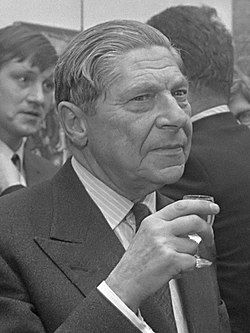Arthur Koestler Quote
I think most historians would agree that the part played by impulses of selfish, individual aggression in the holocausts of history was small; first and foremost, the slaughter was meant as an offering to the gods, to king and country, or the future happiness of mankind. The crimes of a Caligula shrink to insignificance compared to the havoc wrought by Torquemada. The number of victims of robbers, highwaymen, rapists, gangsters and other criminals at any period of history is negligible compared to the massive numbers of those cheerfully slain in the name of the true religion, just policy or correct ideology. Heretics were tortured and burnt not in anger but in sorrow, for the good of their immortal souls. Tribal warfare was waged in the purported interest of the tribe, not of the individual. Wars of religion were fought to decide some fine point in theology or semantics. Wars of succession dynastic wars, national wars, civil wars, were fought to decide issues equally remote from the personal self-interest of the combatants.Let me repeat: the crimes of violence committed for selfish, personal motives are historically insignificant compared to those committed ad majorem gloriam Dei, out of a self-sacrificing devotion to a flag, a leader, a religious faith or a political conviction. Man has always been prepared not only to kill but also to die for good, bad or completely futile causes. And what can be a more valid proof of the reality of the self-transcending urge than this readiness to die for an ideal?
I think most historians would agree that the part played by impulses of selfish, individual aggression in the holocausts of history was small; first and foremost, the slaughter was meant as an offering to the gods, to king and country, or the future happiness of mankind. The crimes of a Caligula shrink to insignificance compared to the havoc wrought by Torquemada. The number of victims of robbers, highwaymen, rapists, gangsters and other criminals at any period of history is negligible compared to the massive numbers of those cheerfully slain in the name of the true religion, just policy or correct ideology. Heretics were tortured and burnt not in anger but in sorrow, for the good of their immortal souls. Tribal warfare was waged in the purported interest of the tribe, not of the individual. Wars of religion were fought to decide some fine point in theology or semantics. Wars of succession dynastic wars, national wars, civil wars, were fought to decide issues equally remote from the personal self-interest of the combatants.Let me repeat: the crimes of violence committed for selfish, personal motives are historically insignificant compared to those committed ad majorem gloriam Dei, out of a self-sacrificing devotion to a flag, a leader, a religious faith or a political conviction. Man has always been prepared not only to kill but also to die for good, bad or completely futile causes. And what can be a more valid proof of the reality of the self-transcending urge than this readiness to die for an ideal?
Related Quotes
About Arthur Koestler
Having moved to Britain in 1940, Koestler published his novel Darkness at Noon, an anti-totalitarian work that gained him international fame. Over the next 43 years, Koestler espoused many political causes and wrote novels, memoirs, biographies, and numerous essays. In 1949, Koestler began secretly working with a British Cold War anti-communist propaganda department known as the Information Research Department (IRD), which would republish and distribute many of his works, and also fund his activities. In 1968, he was awarded the Sonning Prize "for [his] outstanding contribution to European culture". In 1972, he was made a Commander of the Order of the British Empire (CBE).
In 1976, Koestler was diagnosed with Parkinson's disease and in 1979 with terminal leukaemia. On 1 March 1983, Koestler and his wife Cynthia died of suicide together at their London home by swallowing lethal quantities of barbiturate-based Tuinal capsules.
